Mirza Qadiani’s Claim to Prophethood
Respected readers! On the first page of his book “The Rectification of a Mistake”, Mirza Qadiani writes:
“Our community has some members who are less aware of our claims and arguments, who have neither had the opportunity to carefully study the books nor had the chance to stay in the company of others for a reasonable amount of time to complete their knowledge. In some cases, when opponents present an objection, they give an answer that is entirely contrary to the reality. As a result, despite being people of truth, they have to feel embarrassed. For example, a few days ago, an opponent raised an objection to one of our companions, saying, ‘The one you have taken the oath of allegiance from claims to be a prophet and a messenger.’ The response was merely a rejection, but such an answer is not correct. The truth is that the pure revelation from Allah which descends upon me contains the words ‘messenger’ and ‘prophet’ many times, not just once but hundreds of times. How then could such an answer be correct?”
The Rectification of a Mistake, Ruhani Khazain, Volume 18, Page 206
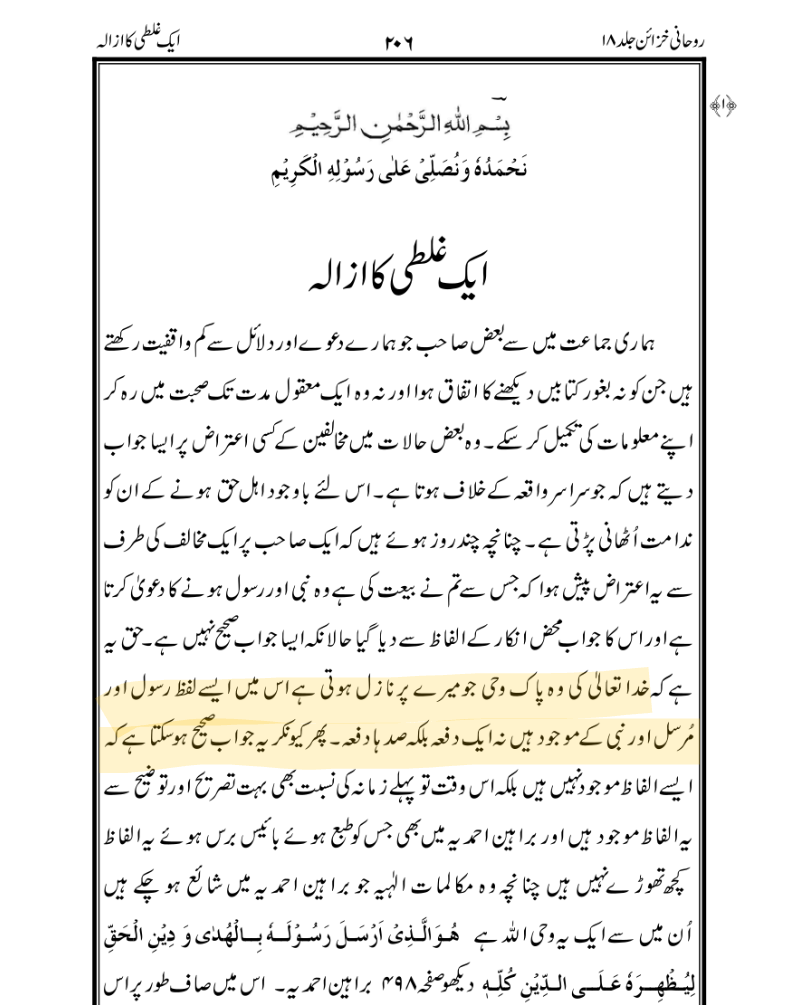
Dear Qadiani followers! From this writing of Mirza Qadiani, we understand and quote the following, hoping that every sensible person will agree with me:
When the followers of Mirza Qadiani, when confronted by opponents who claim that he has made a declaration of prophethood, give a reply of denial, it is incorrect. According to Mirza Sahib, their reply is wrong for three reasons:
- They are not fully aware of Mirza Sahib’s claims and arguments.
- They have not carefully read his books.
- They have not spent a sufficient amount of time in his company to complete their understanding.
Now, when the scholars of Islam, based on these revelations in which the words prophet and messenger are mentioned, declared Mirza Qadiani as a disbeliever, Mirza Sahib wrote in his 1894 publication Hamaamat al-Bushra (an Arabic book):
“One of the objections raised by the disbelievers is that they say that this man claims to be a prophet and says, ‘I am from the prophets.’ The answer is that, ‘O my brother, know that I never claimed prophethood nor did I say to them that I am a prophet. Rather, they acted hastily and misunderstood my words. They did not think carefully, but recklessly made a false accusation.'”
Ruhani Khazain, Volume 7, Page 296
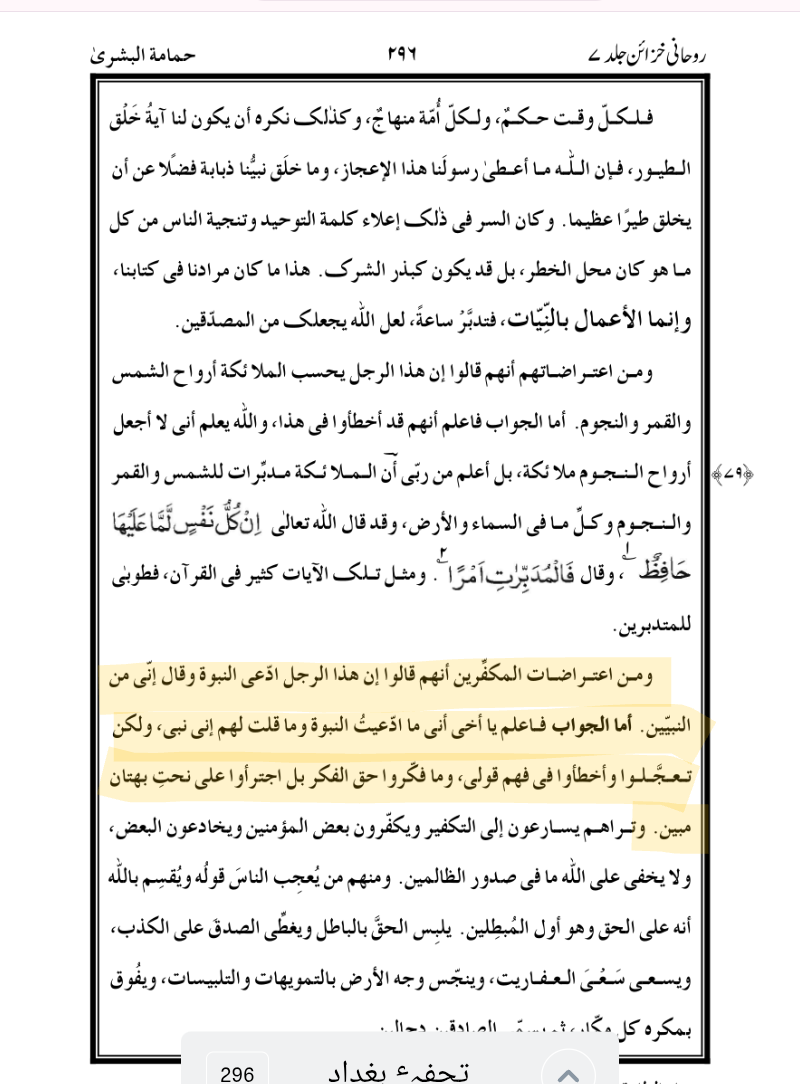
Now tell me, when the opponents derived the conclusion that Mirza Sahib claimed prophethood and declared him an infidel, Mirza Sahib not only denied his claim to prophethood but also called it a great falsehood and stated that those who accused him had acted hastily and misunderstood his words. On the other hand, when the same objection was raised in front of his followers, he deemed their rejection as incorrect and stated that they were not fully aware of his claims and arguments nor had they read his books carefully.
Dear Qadiani followers! You should now reflect upon whether Mirza Sahib was lying in Hamaamat al-Bushra or was he being deceptive in The Rectification of a Mistake? Let us now present more explicit evidence from Mirza Sahib’s writings where he denies the claim of prophethood.
In his 1308 Hijri publication Tafseer-e-Maram, which is available in Ruhani Khazain Volume 3, he writes on the cover page of this book, which was published in 1891, that when Mirza Sahib Qadiani changed his belief regarding the life of Jesus (as) and claimed to be the ‘likeness of Christ,’ the scholars of Islam objected, saying, ‘Jesus was a prophet, are you also claiming prophethood?’ To this, Mirza Sahib Qadiani wrote:
“If an objection is raised here that the Messiah’s likeness must also be a prophet, the first answer is that the coming Messiah, as per our Master and Lord, did not have prophethood as a condition. Rather, it is clearly written that he will be a Muslim and will follow the Shari’ah of the Muslims.”
Ruhani Khazain, Volume 3, Page 59
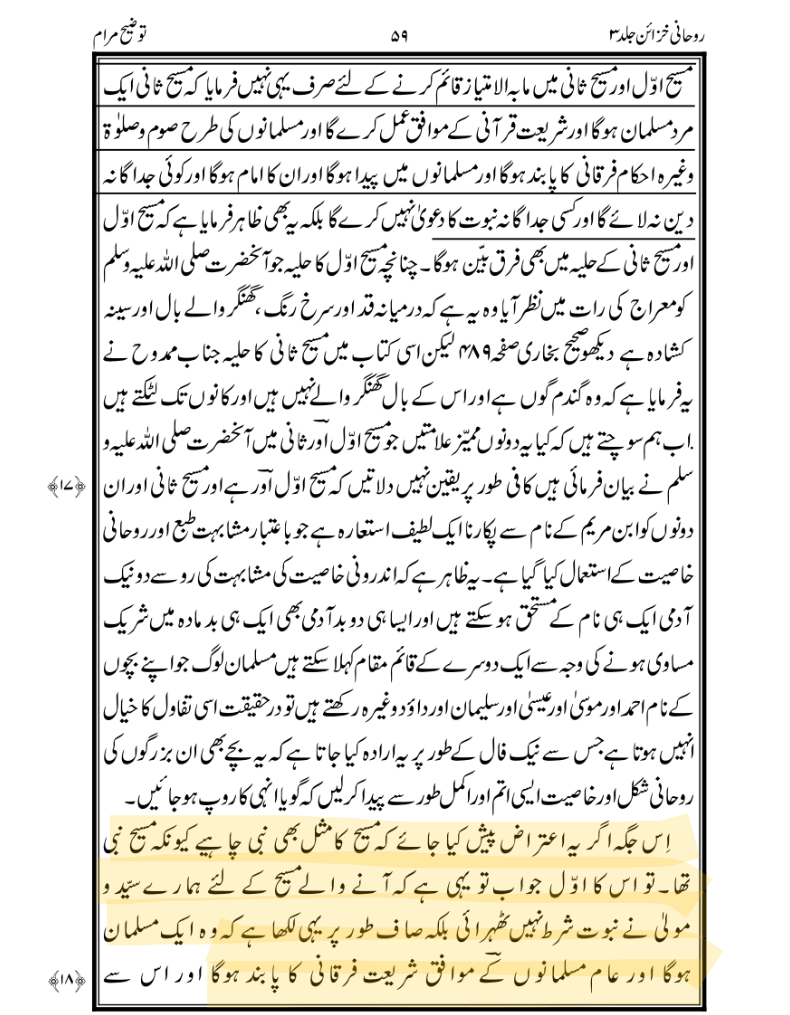
In 1891, Mirza Qadiani published an advertisement in which he wrote:
“I believe in all the matters included in Islamic beliefs and, as per the belief of the Ahl al-Sunnah Jama’at, I accept all things that are confirmed by the Qur’an and Hadith. I consider anyone who claims prophethood or messengerhood after our master, the Messenger of Allah, Prophet Muhammad (peace be upon him), to be a liar and a disbeliever. I firmly believe that the revelation of prophethood began with Adam, the chosen one, and ended with Muhammad, the chosen one.”
Mujmua Ishtiharat, Volume 1, Page 214, Dated 2nd October 1891
“I do not claim prophethood, nor do I deny the miracles, angels, or the Night of Decree, etc… and after the last of the Messengers, Muhammad Mustafa (peace be upon him), I consider anyone who claims prophethood or messengerhood to be a liar and a disbeliever.”
(Mujmua Ishtiharat, Volume 1, Page 232, Dated 2nd October 1891)
In his 1891 book Izalah-e-Awaham, Mirza Qadiani wrote while presenting arguments for the death of Jesus (as):
مَا كَانَ مُحَمَّدٌ أَبَا أَحَدٍ مِّن رِّجَالِكُمْ وَلٰكِن رَّسُولَ اللَّهِ وَخَاتَمَ النَّبِيِّينِ.
Meaning: “Muhammad (peace be upon him) was not the father of any of your men, but he was the Messenger of Allah and the Seal of the Prophets.” This verse clearly shows that after our Prophet Muhammad (peace be upon him), no messenger will come.”
Ruhani Khazain, Volume 3, Page 431

In the same book, he further writes:
“Every wise person can understand that if Allah is truthful and if the promise in the verse Khatam al-Nabiyyin is true and as clearly stated in the Hadiths, that after the death of the Messenger of Allah (peace be upon him), Jibril was forbidden to bring the revelation of prophethood, then no person can come as a prophet after him.”
Ruhani Khazain, Volume 3, Page 412
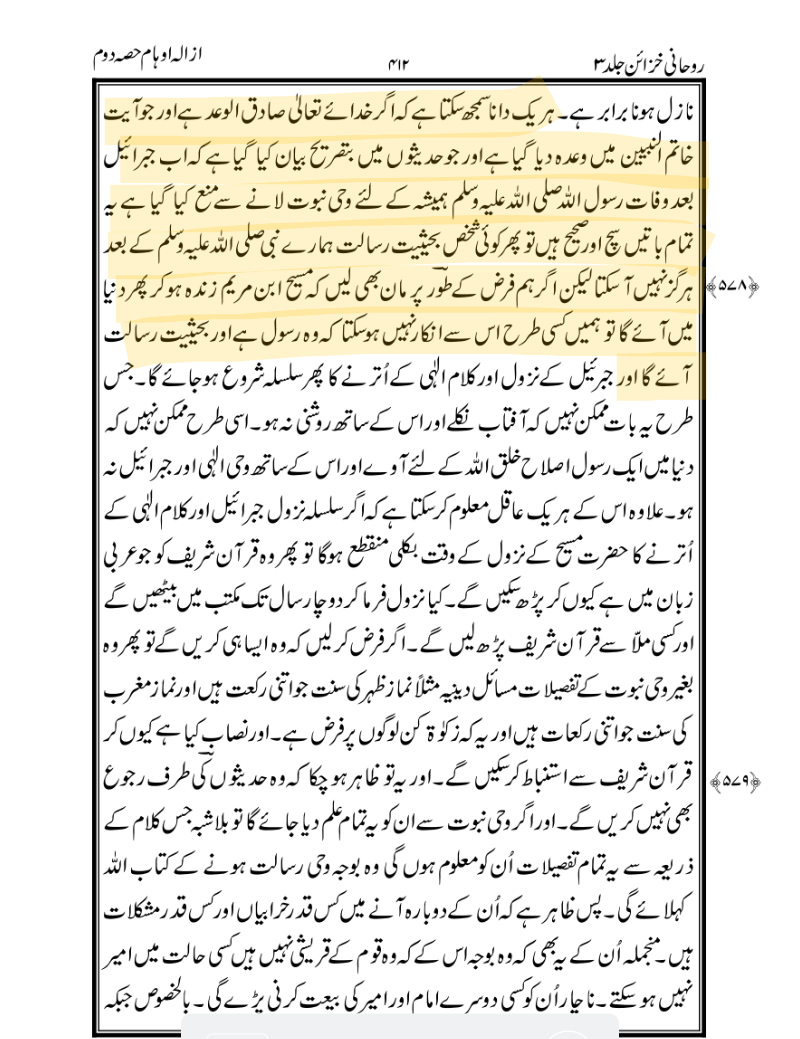
Similarly, in his Arabic book Hamaamat al-Bushra, which was published in 1894, Mirza Qadiani writes:
“Do you not know that the compassionate Lord has called our Prophet Muhammad (peace be upon him) the Seal of the Prophets without any exception and our Prophet (peace be upon him) has clarified in his statement that there is no prophet after me? If we allow the appearance of a prophet after our Prophet Muhammad (peace be upon him), it would mean opening the door of prophetic revelation after its closure, which is contrary to what is evident to Muslims.” (Hamaamat al-Bushra, translated, Page 81-82)
“And it is not permissible for me to claim prophethood and leave Islam and join the disbelievers.”(Hamaamat al-Bushra, translated, Page 291)
In 1896, Mirza Sahib Qadiani wrote in his book Anjam Aatham:
“People of justice should remember that I have never, at any time, truly claimed prophethood or messengerhood, and using any term in a non-literal sense or according to the common meanings in the language does not necessarily imply disbelief. However, I do not prefer using such terms as it may mislead ordinary Muslims.”
(Anjam Aatham, Page 27, Ruhani Khazain, Volume 11, Page 27)

In 1898, Mirza Sahib Qadiani wrote in his book Kitab-ul-Bariyyah:
“Our Prophet Muhammad (peace be upon him) repeatedly stated that no prophet will come after me, and the Hadith La Nabi Ba’adi was so well-known that no one doubted its authenticity. The Qur’an, whose every word is final, confirms this with the verse Wa Khatam al-Nabiyyin, proving that prophethood has ended with our Prophet.”
(Kitab-ul-Bariyyah, Ruhani Khazain, Volume 13, Page 217)
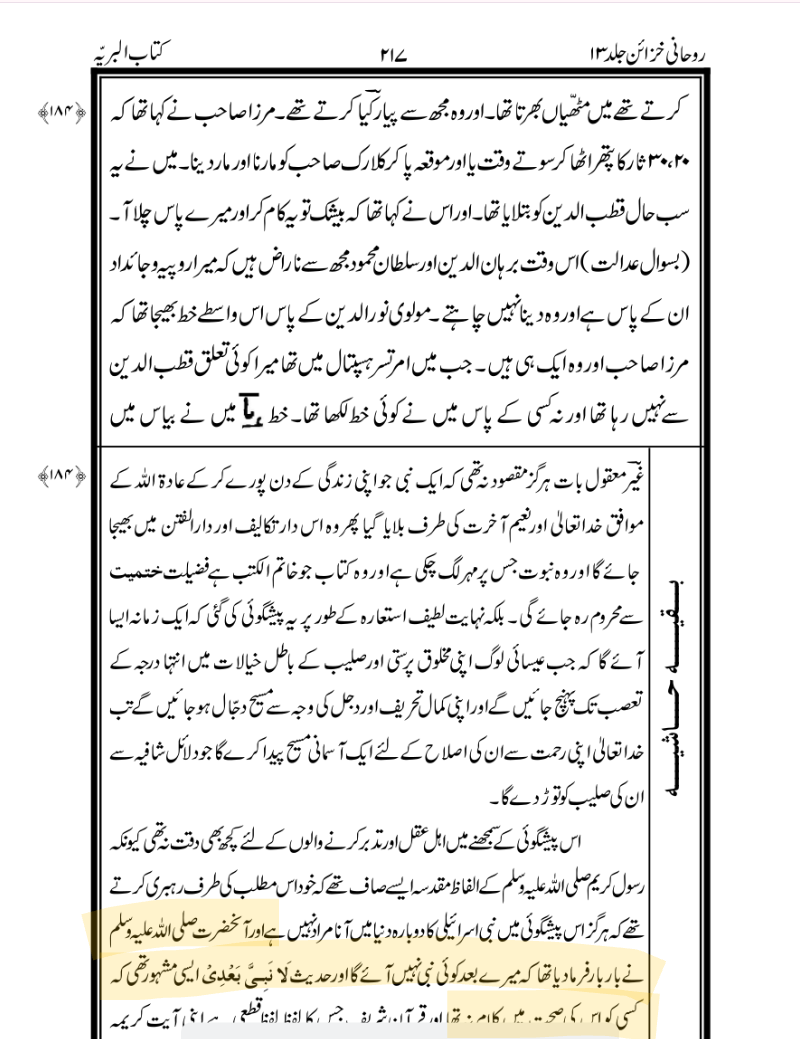
In January 1899, Mirza Sahib Qadiani wrote in his book Ayyam-us-Sulah:
“The Hadith La Nabi Ba’adi also carries a general negation. It is, therefore, audacious and disrespectful to follow the perverse ideas of certain people and intentionally disregard the explicit texts of the Qur’an, and to claim that a prophet will appear after the Seal of the Prophets.”
(Ayyam-us-Sulah, Ruhani Khazain, Volume 14, Page 393)

In the above writing, Mirza Sahib refers to the words La Nabi Ba’adi as a general negation, thereby closing the door to any form of prophethood, whether it be lawful, unlawful, or figurative.